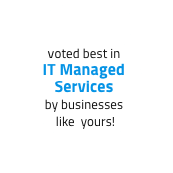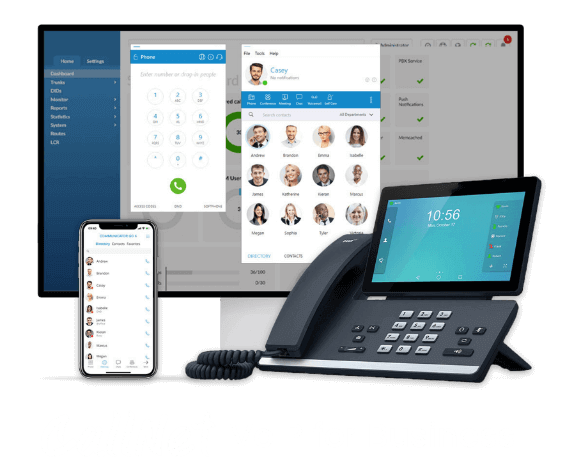When it comes to ensuring the technology infrastructure of your business runs smoothly, two options stand out: managed IT services or hiring an internal IT manager. Both solutions have their unique benefits, but which one is the best fit for your growing business? If you're located in Charlotte, NC, or Charleston, SC, and are debating whether to choose managed IT services or bring on an internal IT manager, this blog will break down the key factors to consider—cost, scalability, flexibility, and more—to help you make an informed decision.
What is Managed IT?
Managed IT refers to outsourcing your IT operations to a third-party service provider. A managed services provider (MSP) typically handles everything from network monitoring and security to data backup and software updates. MSPs are typically available 24/7, offering constant oversight and a proactive approach to IT management.
On the other hand, hiring an internal IT manager involves bringing in an employee who oversees all your company's technology needs in-house. This person is often responsible for setting up new systems, troubleshooting tech issues, and managing the IT budget.
Cost Comparison: Managed IT vs. Internal IT Manager
One of the most significant factors that can influence your decision is cost. Let's break it down:
1. Managed IT Costs
Managed IT services generally operate on a subscription-based pricing model. This means businesses pay a fixed monthly fee depending on the level of service needed. This fee covers a range of services, including system monitoring, cybersecurity, disaster recovery, and more. The cost of managed IT can vary based on the complexity of your IT environment, but typically, businesses can expect to pay anywhere from $500 to $5,000 per month for managed services.
Managed IT providers often bundle services, which means you get access to an entire team of experts without having to pay for each specialist individually. The predictable cost structure helps businesses avoid unexpected IT expenses and budget more effectively. Plus, since MSPs invest in the latest technologies, you're not responsible for purchasing expensive software or equipment.
2. Internal IT Manager Costs
Hiring an internal IT manager comes with a larger upfront investment. According to the average salary for an IT manager in North Carolina or South Carolina, you might pay anywhere from $75,000 to $120,000 per year, depending on the experience and size of your company. In addition to salary, you'll need to account for benefits, taxes, training, and other overhead costs.
Moreover, hiring an internal IT manager often leads to additional hiring costs, such as recruitment fees or costs associated with managing turnover. These hidden costs can add up over time, especially in a competitive job market.
Pros and Cons of Managed IT Services
Pros:
- Scalability and Flexibility: Managed IT providers can quickly scale their services to match the growth of your business. As your company grows, your IT needs can change, and an MSP can easily adapt. Whether you need additional network support, more robust cybersecurity measures, or cloud-based services, MSPs can expand your resources without you needing to hire additional employees.
- Access to a Team of Experts: With managed IT, you're getting an entire team of specialists rather than relying on just one internal IT person. This means quicker problem-solving, diverse expertise, and more comprehensive IT support.
- Proactive IT Management: Managed IT is all about being proactive. Instead of waiting for a problem to arise, MSPs monitor your systems 24/7 and address potential issues before they escalate into significant problems.
- Reduced Downtime: Since MSPs are available around the clock, they can quickly resolve issues, minimizing downtime and ensuring your business operates smoothly.
Cons:
- Less Control: Since your IT functions are outsourced, you have less direct control over the day-to-day operations and management of your IT infrastructure.
- Security Concerns: While most MSPs are highly reputable, some businesses may have concerns about sharing sensitive data with an external party. It's crucial to ensure your MSP follows best practices in terms of data security.
Pros and Cons of Hiring an Internal IT Manager
Pros:
- Direct Control and Customization: An internal IT manager is embedded within your company's culture and can provide tailored IT solutions that are specific to your needs.
- Close Communication: Having an in-house IT person means you have someone dedicated to understanding your business and working closely with other departments to ensure the technology aligns with your business goals.
Cons:
- Higher Costs: As mentioned earlier, hiring an internal IT manager can be costly, especially with salary, benefits, and other overheads. Additionally, you'll likely need to hire more staff as your IT needs grow.
- Limited Expertise: Unless your internal IT manager is a jack-of-all-trades, they may lack deep expertise in certain areas, such as cybersecurity or cloud computing. This could lead to gaps in your IT infrastructure that a managed services provider would typically cover with a broader team of specialists.
- Limited Availability: In-house IT managers typically work 9-5. If an issue arises after hours or on weekends, your business may experience downtime or delays in fixing the issue.
Which Option is Better for Your Growing Business?
For most businesses, especially those that are scaling quickly or looking to stay competitive, managed IT services offer the best flexibility and scalability. Here's why:
- Flexibility: Managed IT can adapt to your business needs as you grow. Whether it's scaling up to accommodate more employees, integrating cloud-based solutions, or enhancing security, an MSP can meet your evolving requirements.
- Cost-Effective: With a fixed monthly fee and access to a team of experts, managed IT services are often more affordable than hiring and retaining an internal IT manager. As your business expands, the scalability of managed services allows you to adjust without the added overhead.
- Proactive IT Management: Proactive IT Management: MSPs are focused on keeping your systems up and running with proactive monitoring, software updates, and issue resolution. This reduces the risk of unexpected downtime that could hurt your business operations.
Making the Right Decision
Choosing between managed IT and an internal IT manager depends on the needs, goals, and budget of your business. For many growing businesses, managed IT services provide a more cost-effective, scalable, and flexible solution. If you're in Charlotte, NC, or Charleston, SC, and are considering your options for IT support, working with a trusted managed IT provider like TotalBC can help you ensure that your business stays competitive, secure, and running smoothly without the overhead of hiring an in-house team.
TotalBC offers comprehensive outsourced IT services tailored to meet the needs of businesses in the Carolinas, with expertise in everything from network security to cloud computing. If you're ready to optimize your IT infrastructure, contact TotalBC today at 866-673-8682 to learn how managed IT can be the right choice for your growing business.








